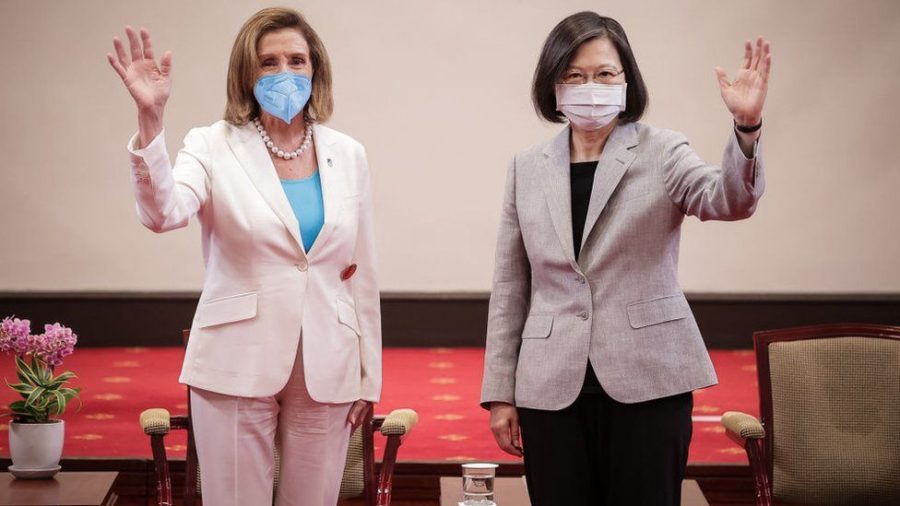House Speaker Nancy Pelosi visits Taiwan, holds press release with President Tsai Ing-Wen
Matt Murphy & Patrick Jackson, Flickr
U.S. House Speaker Nancy Pelosi and Taiwanese President Tsai Ing-Wen wave to Taiwanese officials at a press conference in Taipei on Aug. 2. During the conference, Pelosi stated that she was dedicated to supporting Taiwan and promoting further collaboration between the two countries.
September 21, 2022
House Speaker Nancy Pelosi flew to Taiwan on Aug. 2 to meet with lawmakers and President Tsai Ing-Wen to reinforce U.S-Taiwan relations, heightening tensions between the U.S. and China.
The Chinese government immediately announced military advancements in retaliation for Pelosi’s visit. China began live-fire military drills in six zones surrounding Taiwan on Aug. 4, simulating a blockade through sea and air. China also suspended imports of over 100 categories of Taiwanese goods the day before her arrival.
The Chinese Foreign Ministry released a statement that Pelosi’s visit violated the one-China policy held by the U.S., under which the U.S. acknowledges that Taiwan is part of the People’s Republic of China (PRC). According to the Ministry, a visit by a foreign government official recognizes Taiwan’s sovereignty and “severely threatens peace and stability across the Taiwan Strait.” Pelosi is the highest ranking official to visit Taiwan in 25 years.
In an effort to maintain the United States’ global mission towards democracy, the Biden administration committed to protecting Taiwan against any Chinese attacks. The Biden administration says that Pelosi’s visit has not changed U.S-Taiwan relations. Though the nations do not have official relations, they hold substantial nondiplomatic relations through the Taiwan Relations Act.
“Today our delegation came to Taiwan to make unequivocally clear: we will not abandon our commitment to Taiwan, and we are proud of our enduring friendship,” Pelosi said in a press conference with President Tsai.
Upper school history and social science teacher Dr. Chuck Witschorik commented that the situation is complicated because increased tensions between the U.S. and China could hinder conversation on important global issues such as climate change.
“What remains to be seen is can diplomacy win out in the long run, can the United States find a way to support democracy in Taiwan and continue to dialogue with the People’s Republic of China?” Dr. Witschorik said.
Taiwan first came under Chinese control in the 17th century and again after Japan lost World War II. Taiwan split from China in 1949 after a civil war, becoming a geo-political flashpoint for conflict between China and the U.S. China points to this evidence to claim Taiwan under its territory, while Taiwan insists that it was never a part of the PRC. China officially cut off contact with the Taiwanese government in 2016, after President Tsai refused to recognize Taiwan as a part of a larger Chinese nation. Tensions came to an all-time high following Pelosi’s visit, which a Chinese foreign ministry spokesperson condemned as “a gross interference in China’s internal affairs.”
Even with China’s retaliation, the economic impact of the Chinese trade bans on Taiwan are moderate, since China is Taiwan’s biggest trade partner. Actions to increase the severity of the punishments, such as instilling a complete blockade by closing Taiwan’s ports, would backfire and harm the Chinese economy as well. Neo Alpha (11) commented that Pelosi’s visit served mostly as an opportunity for China to pose military threats.
“Pelosi’s visit sent a message that the U.S. still has a strong commitment to defending Taiwan, but I’m not particularly inclined to believe that it’s going to be super consequential beyond the domain of China taking it as an opportunity to construct some sort of threat,” Neo said.
Pelosi’s Taiwan visit was one stop along her 4-day tour of Asia which began Aug. 1, which also included Singapore, Malaysia, Japan and South Korea. The house speaker stated that the goal of the tour was to discuss “peace and security, economic growth and trade, the COVID-19 pandemic, the climate crisis, human rights and democratic governance” in a press release on July 31.


















![“[Building nerf blasters] became this outlet of creativity for me that hasn't been matched by anything else. The process [of] making a build complete to your desire is such a painstakingly difficult process, but I've had to learn from [the skills needed from] soldering to proper painting. There's so many different options for everything, if you think about it, it exists. The best part is [that] if it doesn't exist, you can build it yourself," Ishaan Parate said.](https://harkeraquila.com/wp-content/uploads/2022/08/DSC_8149-900x604.jpg)




![“When I came into high school, I was ready to be a follower. But DECA was a game changer for me. It helped me overcome my fear of public speaking, and it's played such a major role in who I've become today. To be able to successfully lead a chapter of 150 students, an officer team and be one of the upperclassmen I once really admired is something I'm [really] proud of,” Anvitha Tummala ('21) said.](https://harkeraquila.com/wp-content/uploads/2021/07/Screen-Shot-2021-07-25-at-9.50.05-AM-900x594.png)







![“I think getting up in the morning and having a sense of purpose [is exciting]. I think without a certain amount of drive, life is kind of obsolete and mundane, and I think having that every single day is what makes each day unique and kind of makes life exciting,” Neymika Jain (12) said.](https://harkeraquila.com/wp-content/uploads/2017/06/Screen-Shot-2017-06-03-at-4.54.16-PM.png)








![“My slogan is ‘slow feet, don’t eat, and I’m hungry.’ You need to run fast to get where you are–you aren't going to get those championships if you aren't fast,” Angel Cervantes (12) said. “I want to do well in school on my tests and in track and win championships for my team. I live by that, [and] I can do that anywhere: in the classroom or on the field.”](https://harkeraquila.com/wp-content/uploads/2018/06/DSC5146-900x601.jpg)
![“[Volleyball has] taught me how to fall correctly, and another thing it taught is that you don’t have to be the best at something to be good at it. If you just hit the ball in a smart way, then it still scores points and you’re good at it. You could be a background player and still make a much bigger impact on the team than you would think,” Anya Gert (’20) said.](https://harkeraquila.com/wp-content/uploads/2020/06/AnnaGert_JinTuan_HoHPhotoEdited-600x900.jpeg)

![“I'm not nearly there yet, but [my confidence has] definitely been getting better since I was pretty shy and timid coming into Harker my freshman year. I know that there's a lot of people that are really confident in what they do, and I really admire them. Everyone's so driven and that has really pushed me to kind of try to find my own place in high school and be more confident,” Alyssa Huang (’20) said.](https://harkeraquila.com/wp-content/uploads/2020/06/AlyssaHuang_EmilyChen_HoHPhoto-900x749.jpeg)












